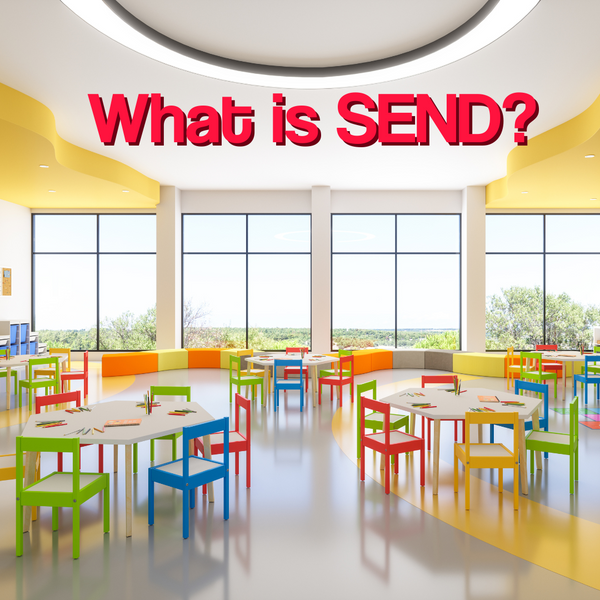Free delivery on orders over £40, only £3.95 under £40
Free delivery on orders over £40, only £3.95 under £40
Welcome to our blog, your one-stop resource for news, features and resources for living life to the fullest. View our articles on the latest mobility products and features with disability bloggers.
Posted by Francis Whitehead on February 21, 2024

If you have a child with a learning disability, learning difficulty, or any other physical or mental condition that can affect their ability to learn, you may be concerned about them getting the education they need. Luckily, the SEND system is implemented in all schools in the UK.
SEND stands for:
Special
Educational
Needs
and
Disabilities.
The SEND system supports children and young adults who may require additional needs throughout their education, from nursery to university. This includes people with learning disabilities.
Some children and young adults may require more help to learn and develop than their peers of the same age. If this is the case, they may be classed as having special educational needs (SEN) so they can get the extra support they need.
Every place of education must identify which children require SEND support so that it can plan how it will go about meeting their needs in the present and future.
People who require SEND support will be identified in many different ways. Some may have their SEN identified by a health worker or a paediatrician early on in their life, and some children and young people’s needs may become evident later on in life, for example when they enter a certain stage of education.
Some children’s SEN can be predicted in early age. As soon as a parent knows their child has a learning disability or any other condition that affects their ability to learn, they can enquire in their place of education to get the support they need. To make sure they get the education they require, the sooner a child can get the support they need, the better.
Once someone is identified as having SEN, the staff must follow this process:
Assess: A teacher or supervisor who is currently educating your child must talk to a child’s parents or the young person themselves to work out what support might be needed.
Plan: once their needs have been identified, staff must work together with them and their family to decide what outcomes they want them to achieve and what support should be put in place to help them achieve those outcomes.
Do: the staff, supported by the special educational needs coordinator (SENCO) put the decided support into practice.
Review: the support received by the child or young person should be reviewed by everyone involved to see if it is working. If it is, it might continue. If it is not working, or if the outcomes have been achieved, some of the arrangements might be changed.
The four broad areas of need in SEND support are:
Communication and Interaction
This area of need includes people on the autism spectrum and those with speech, language and communication needs. They might have difficulties in both listening and speaking.
Cognition and Learning
This includes people with specific learning difficulties, moderate learning difficulties, severe learning difficulties and profound and multiple learning difficulties. Specific learning difficulties include a range of conditions such as dyslexia, dyscalculia and dyspraxia.
Social, Emotional and Mental Health Difficulties
This includes anyone who has an emotional, social or mental health need that is impacting on their ability to learn. Mental health conditions such as anxiety or depression can significantly impact someone’s ability to learn. Conditions like ADHD can also make an impact on learning, with organisation and routine being made difficult to follow.
Sensory and/or Physical Difficulties
This area includes people with a hearing impairment, visual impairment, multi-sensory impairment, physical disabilities and dyspraxia. They may need specialist equipment to access learning and other opportunities available to their peers.
Most children of school age who have SEN or disabilities will attend a mainstream school. Some children with more severe learning disabilities may need to be taught in a different type of school. This could be in a mainstream school with extra support (called 'enhanced provision') or a special school.
Support is given in class time, alongside normal teaching. All the while, progress is monitored and key areas of success, and areas where a child might be struggling are identified, and appropriate action can take place.
All mainstream schools, and nursery schools, must have a SENDCo (or SENCo). This stands for Special Educational Needs Coordinator.
A SENDCo is a qualified teacher who has had extra training in SEND, and they arrange all the extra support for children and young people with SEN.
Their job is to:
It’s a relief to know there are a wealth of resources for people who require SEN, and their parents or carers. Every local council must have a SEND local offer, that offers advice, help and resources for all people who require SEN from 0-25 years of age. For example, the Lancashire County Council website has a directory for all stages of education.
The Special Educational Needs and Disabilities Information Advice and Support Services young people with SEND. This service is also offered directly to young people.
SEND Supported is another fantastic website with a wealth of resources relating to all conditions that fall under SEND.
You may also wonder about resources you can use outside of education when you are a parent or carer of someone with SEND. Luckily, Ability Superstore have a brilliantly useful range of products that can assist your daily living.

Designed in conjunction with teachers and learning support assistants to support children with ADHD, the practical resources in the ADHD Classroom & Home Kit focus on behaviour, impulsiveness, concentration, noise levels, rewards and instruction. This makes helping someone with ADHD learn to their full potential and is a versatile kit to use at home and in the classroom.

This Autism Resource Kit is especially useful for those on the spectrum, those with social communication difficulties and those with English as a second language. This kit helps children to communicate more effectively, to make better decisions and to aid understanding of what is happening next, routines & sequences.

The Mini Rocking Board can allow children with SEN to engage in rocking motions in a safe manner. It's equipped with a non-slip surface to ensure a secure grip during use. The wooden frame adds durability to the structure, promising a long-lasting and reliable resource for sensory integration and developmental activities.
We at Ability Superstore hope that this article has been informative for you. If you have any questions about the products featured in this article, please don't hesitate to ask. We will be more than happy to help you!